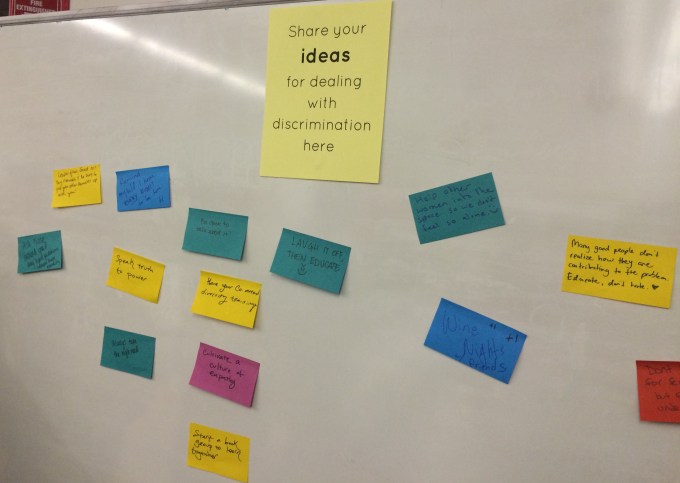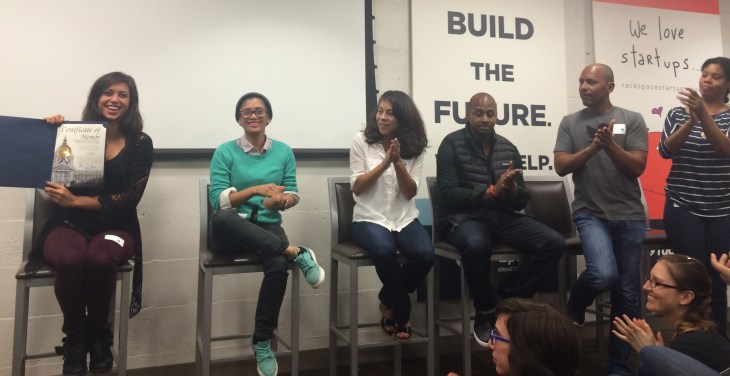The #ILookLikeAnEngineer movement, an effort to highlight diversity in the tech industry, is still going strong. Last night, over 200 underrepresented engineers and supporters came together in San Francisco to talk about diversity and share their experiences about working in the tech industry.
At the event, OneLogin Platform Engineer Isis Wenger (pictured above) received a certificate of honor from the San Francisco Board of Supervisors for battling sexism and racism through the #ILookLikeAnEngineer hashtag.
The sold-out event at Rackspace featured a diverse set of powerful, inspiring and heartfelt talks from Wenger, No. 8 Media, Inc. Founder and CEO Alicia Morga, BuildUp.vc Co-founder and General Partner Wayne Sutton, Twitter Engineering Manager Leslie Miley, Slack Senior Engineer Erica Joy Baker and Twilio Software Engineer Dom DeGuzman.
The panelists talked about being diverse individuals in the tech industry, the power of the #ILookLikeAnEngineer hashtag, and what needs to happen in order for tech to be a truly diverse industry. Here are some of the most powerful quotes from the night:
“This ecosystem can make you feel unwelcome,” Sutton said. “Like you’re not valued as a human being.”
“There are very few industries where you can change the world,” Miley said. “This is one of them.”
“Think of people as people first,” Baker said. They can be anything… have any interest. Break those preconceived notions.”
“White people only understand one language from black people,” Miley said. “That’s the language of disturbance. They start listening when it becomes a press issue. They start listening when we stand up and talk.“
“You used my platform for something that is bigger than all of us,” Miley said. “This puts in everyone’s face that we are not some number, that we are not some statistic, that we are not tokenized, that we cannot be used as some recruiting tool.”

There was also a space for people to share their advice for dealing with discrimination, as well as space to talk about both positive and negative experiences in tech. Regarding discrimination, people wrote things like, “Have your co. attend diversity trainings,” “Help other women into the space so we don’t feel so alone” and, “Remind myself I have EVERY RIGHT to be here.”
Ultimately, the culture at existing startups needs to change, and big and small companies alike need to implement sensitivity and unconscious bias trainings for employees. At the same time, diverse people in tech need to support each other.
“We need to do what we’re doing here,” Sutton said. “We need to build on this community. We need to thrive on this community.”
Other than connecting the #ILookLikeAnEngineer supporters in real life, the event aimed to raise more money for the billboard campaign. The #ILookLikeAnEngineer billboard campaign initially aimed to raise $3,500 on Indiegogo, but has since increased the amount to $35,000 because the organizers underestimated how much creating a billboard actually costs, the event organizer, Michelle Glauser of Zana, said at the event last night.
Moving forward, Wenger urged the audience last night to ask themselves three questions. In fact, they are questions every single one of us in tech should ask ourselves:
- How can I become more mindful of my own biases to help be part of the solution?
- How can I both communicate more and make myself more receptive towards what others have to share?
- How can companies cultivate a more inclusive environment that encourages empathy and open communication?
I left the event feeling energized and inspired. That being said, it’s disheartening to know that the people who really needed to hear those stories, like straight, white men, were very few and far between at the event.
